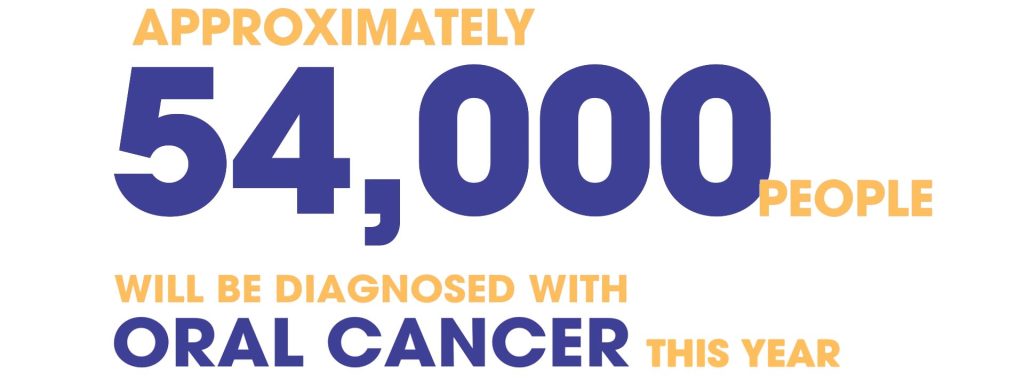
Early oral cancer may show signs like white or red patches inside the mouth, persistent sores or ulcers, thickened tissues, lumps or bumps in the neck, difficulty swallowing or chewing, chronic sore throat, numbness in the mouth or tongue, and unexplained ear pain without hearing loss.
The word “cancer” incites fear in all of us. We know that cancer can affect any area of the human body. Our best defense against cancer is knowledge! We need to know which cancers are preventable, how we can achieve the highest chance of survival, and what our individual risk factors are.
April is Oral Cancer Awareness Month and during this month, our goal is to raise awareness. The mortality rate in oral cancer is relatively low when detected early.
Oral cancer is any type of cancer that occurs within the oral cavity, including the upper and lower jaws. Oral cancers fall under the larger category of head and neck cancers. The majority of oral cancers are squamous cell carcinoma, which begins on the most superficial layer of the oral mucosa (the lining of the inside of the mouth). You may be familiar with the term squamous cell carcinoma as it is also a prevalent type of skin cancer.
Early detection is key to survival from oral cancer.
The earlier a doctor identifies and treats oral cancer, the higher the rate of survival. Oral cancer caught in later stages has a much lower survival rate and requires more aggressive treatment.
For more statistics about oral cancer, we recommend visiting the Oral Cancer Foundation’s website.
Preventative screenings increase your chances of detecting cancer early. Doctors will often recommend monthly physical exams you can perform at home. It’s important to make note of any lumps, discoloration, or abnormalities in an organ and share any findings with your doctor. The same is true for oral cancer detection. Regular at-home and professional exams (performed during your 6 month hygiene cleanings) are key to detecting cancer in its earliest stages!
Self-Screenings
Every adult should be screening his or her own mouth for oral cancer at least once per month. During your screening, you should use a bright light or magnifying mirror to help you see the inside of your mouth. If you find anything that looks abnormal or seems to not blend in with the surrounding tissues, schedule a consultation with your dentist right away.
Using light pressure, you should also feel your cheeks, lips, tongue, jaws and neck with your fingertips. Identify any lumps or bumps that are not present on both sides of the face and any swelling that is tender to pressure.
Check Your Mouth has great instructions with photos to show you how to perform a thorough self-screening for oral cancer at home.

Professional Screenings
No matter how thorough you are, you simply cannot see every area of your mouth on your own. A professional oral cancer screening is recommended at a minimum of once per year by your dentist.
Most dentists perform an oral cancer screening at every regular check up. Dental hygienists also have specialized training in evaluating the inside of the mouth and can often notice abnormalities during the professional teeth cleaning procedure.
Oral cancer screenings are performed as a part of the periodic oral evaluation, as opposed to a separate procedure. For this reason, it is easy for patients to “miss” that their dentist is performing the screening. If your dentist does not verbally say anything about oral cancer, and you are not sure whether the screening has occurred, simply ask your dentist. Usually the reason your dentist won’t say anything is because they see nothing abnormal, which is a good thing!
Professional oral cancer screenings are typically visual exams, and they are painless. Some dentists employ the use of lights or tissue swabs to identify any abnormal cells.
Signs are visible changes that you or your dentist can detect. Symptoms are sensations that the patient can feel but cannot be visualized or measured. The most important thing for you to know about oral cancer is that it does NOT cause noticeable symptoms in its earliest stages! Oral cancer, in its earliest stages, causes signs, not symptoms. This is why screenings, both self and professional, are essential to early detection. You cannot rely on something feeling noticeably different or painful to alert you to oral cancer’s presence.
The American Academy of Oral and Maxillofacial Surgeons created this helpful oral cancer information page, which includes signs and symptoms to look for in your monthly self-screenings.

Risk Factors for Oral Cancer and Ways to Lower Them
Knowledge is key. When you know the factors that increase your risk for oral cancer, you can actively choose to reduce your risk to protect your loved ones.
1. Tobacco Use – Tobacco users have the highest risk for developing oral cancer. This applies to smoking, vaping, and use of all forms of smokeless tobacco. The more tobacco you use, and the longer you have used it, the higher your risk. You can lower your oral cancer risk by stopping all tobacco use as early as possible!
2. Alcohol Intake – Alcohol is another high risk factor, and interestingly, it has an exponential effect on oral cancer diagnosis when added to tobacco use. Those who use tobacco and drink alcohol have a multiplied risk for oral cancer. Limit your alcohol intake to lower the risk as much as possible.
3. Sun Exposure – Oral cancer can also occur on the lips. This form of “skin cancer” is technically oral cancer since it affects the mouth. You can reduce the risk of oral cancer on the lips by wearing a lip balm with an SPF 15 or greater.
4. Chronic Dental Disease – Chronic dental disease equates to chronic infections and chronic inflammation in the mouth. This chronic inflammation actually increases your risk for all types of cancer! Maintain great oral hygiene and see your dentist regularly to prevent any active dental disease as soon as possible.
5. HPV Infection – HPV is a sexually transmitted virus. Certain strains of the Human Papilloma Virus are associated with oral cancers that occur in the oropharynx (the region where your mouth connects to your throat). Cancers caused by HPV typically affect younger people who do not have the traditional oral cancer risk factors. They also usually occur in areas that are difficult to visualize at the back of the throat, reminding us of the importance of professional screenings with your dentist.
Many Americans know very little about oral cancer and its risk factors. You can help raise awareness by speaking to your friends and family members. Learn more by asking your dentist to educate you about risk factors and prevention techniques unique to you.
Begin the screening process today! Use the resources we have included in this article to practice checking for signs of oral cancer at home. Then, if you are not already keeping consistent dental visits and undergoing professional oral cancer screenings, make an appointment with us today!